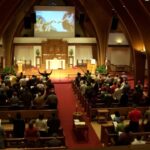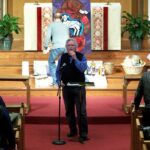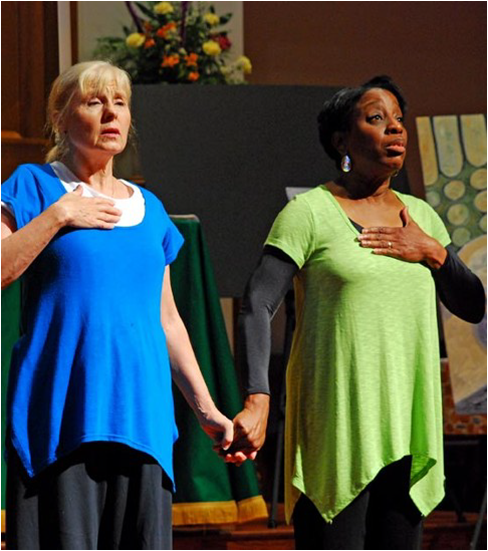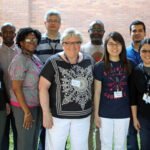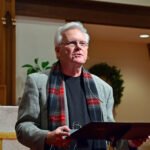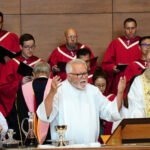Column: Dean Emeritus of the Chapel
By Darrell A. Harris, D.W.S. Honoraria
The Way We Were . . . and Are: View from the Chaplain’s Chair
My assignment in the summer of 1999 sounded easy. Our late founder, Dr. Robert Webber, asked: “Can you lead a half-hour chapel service each morning including a 10-minute “chapel talk?” At “first blush” that sounded very doable. When our daughters were young kids I wanted to start evening family devotions. My bride “strongly suggested” that I keep the entire program under 10 minutes.
At one time, President Jim Hart was not only a student in our inaugural IWS class but also a part-time employee of IWS and worship leader at our original host church. One day I asked him what he thought morning chapel should look like, structurally. Without hesitation, he suggested the 3-fold “monastic order” of praises, scripture, and prayers.
Although I didn’t have that verbiage then, it should have occurred to me. When leading family devotions years before, our little “liturgy” was 1) singing a praise song the kids could sing along with, 2) reading and discussing a scripture verse or two, 3) memorizing, over a period of time, the Lord’s Prayer, Psalm 23, the Ten Commandments and the Apostles Creed, which resulted in cycling the Psalm, Commandments, and Creed in rotation, saying one each evening concluding with 4) extemporaneous prayers and the Lord’s Prayer.
I already knew how to lead a service in the 3-fold monastic structure, I just didn’t know that I did!
Each incoming IWS class is unique in mix and makeup. Before long we had a class arrive that included a number of adherents of one particular denomination. They did not seem pleased with morning chapel. A chat with one who was a Pastor helped me understand they did not believe a Christian worship service was authentic without the “proclamation of the Gospel.” I think what he meant was hearing a reading from one of the four Gospels. However, at that time I heard it through the Southern Baptist filter of my youth and thought he was asking for a clear presentation of the plan of salvation and perhaps even an altar call in every service.
That night I lay sleepless on my pillow, wrestling with how we might measure up to that standard in our context. In the wee hours, it came to me—the succinct Memorial Acclamation: “Christ has died; Christ is risen; Christ will come again.” I ran that by our Pastor/student and he seemed satisfied. Praise God from whom all blessings flow! From that point on, every morning chapel has concluded with that declaration and the passing of the peace.
At another point in our IWS journey, it seemed like shared communal silence would be in order. So we introduced it by describing corporate silence: it is for listening rather than speaking praises, prayer lists, intercessions, etc. A minute or two of uncomfortable silence passed that morning. Then I began to hear rustling as a few bags were being opened to find tissues. The sniffles that frequently accompany tears could be heard. Then we concluded with spontaneous prayers and the Lord’s Prayer. Silence became a welcome and powerful practice in our worship.
At some juncture, it dawned on us that only the more vocal among us verbally participated in the extemporaneous prayers. The preponderance of those gathered remained silent. It occurred to us that we could begin our prayers using one of the two sets of “Suffrages” (I know, terrible word!) found on pages 97-98 in Morning Prayer, Rite II in the Book Of Common Prayer. That way, even the most reticent among us could verbalize those prayer intentions, mostly taken from the Psalms, and the concluding Lord’s Prayer, even though they remained silent during the extemporaneous prayers.
Constance Cherry’s article, “My House Shall Be Called a House of Announcements,” from years ago helped us understand the prominent place scripture deserves in our worship. Jeff Barker’s theater and verbal presentation expertise impacted the dynamics of scripture presentation. I have found it delightful and rewarding when the students’ ministry leaders and internship supervisors almost universally spoke glowingly about the renewal and new-found power of scripture presentation and corporate prayer in their churches as a result of the students’ IWS education.
Another significant development emerged: finding our own “worship voice” rather than trying to emulate the model and style of any single worshiping community. The fact that each IWS session is infused with new student worshipers, musicians, readers, etc. from around the globe makes finding that voice a bit of a moving target. However, since ethnic diversity is among the lavish blessings in the IWS community, it has been quite an adventure to both pray and sing praises together in various languages. With that dynamic in play, one begins to wake up to the reality of worshiping with our sisters and brothers in Christ in the larger global community. That has been an ongoing game-changer as well as a foretaste of glory divine!
Quite a few years ago, I told a story in chapel about my Dad dying suddenly when I was 13 years old. The mother of a close friend of mine told my mom that her son said he’d like to share his dad with me. When my mom told me, I thought it was sweet and loving of him, of course, and although I liked his dad, I wanted my own dad back. Like all of us, my dad was a sinner being saved by grace, but he was such a good man, and always affectionate even to his 13-year-old son.
Then I thought of all the people I know who either didn’t know their dad or had a broken relationship with him. I wished for a moment that I could offer them what my friend had offered me. But I realized they already had an even better offer. Jesus, who has always had the perfect relationship with his Father, is willing to share him with each one of us.
The hurts that were present in chapel that morning were obvious in the tears being wiped around the room. Bob Webber and I chatted a few minutes following chapel and I said I wished my dad could have been there with us that morning to hear what he had meant to me. Bob grinned and said, “Oh, he was!” Then I was wiping tears—tears of joy. The communion of saints is one mystical body, both here and beyond the veil.
It is impossible for me to say what my 20-year journey in the IWS community has meant. Especially the worship, the learning, the koinonia, and the friendships. The late Levon Helm, drummer for the legendary rock group, The Band, wrote in his memoir that he enjoyed every show they played from the best seat in the house—the drummer’s chair. I know what he meant. Participating in all this from the chaplain’s chair has been the gift of a lifetime.


